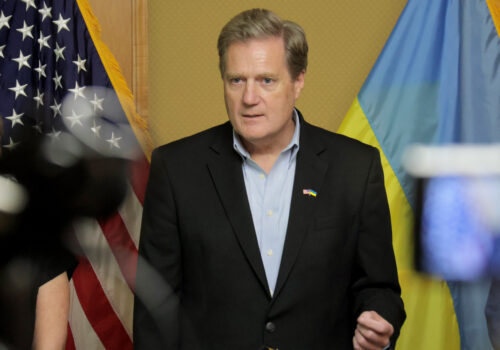Whoever is elected US commander-in-chief this week will have a daunting inbox. However, none of the challenges will be of greater significance than deciding what to do about what former National Security Advisor Stephen Hadley, in a new essay in Foreign Affairs, calls the “Axis of Losers.”
Less colorfully, he explains that this refers to “the burgeoning cooperation among China, Iran, North Korea, and Russia,” a challenge serious enough that experts fear it could plunge the world into either World War III or “a slew of separate conflicts scattered around the globe.”
At the Atlantic Council, where Hadley serves as the chair of our International Advisory Board and an executive vice chair of the Board of Directors, we’ve been debating what to call this quartet of autocrats, which some compare in its potential to the German-Italian-Japanese axis of World War II, or worse.
“Axis of Evil” already has been used. “Axis of Chaos” understates their common cause. “Axis of Autocrats” suggests all authoritarian leaders agree with them (and they certainly don’t). “Tryst of Tyrants” alliterates but trivializes. In my own writings, I’ve chosen “Axis of Aggressors,” so Hadley’s new entry in the naming stakes intrigued me.
However, what’s significant about the piece isn’t the clever turn of phrase. What makes it a must-read for the next US president is Hadley’s compelling recipe for a response.
Hadley starts with the premise that China is both the most significant long-term concern for Washington among these four actors and, at the same time, the only one—the others being rogue states in their regions—that is so deeply integrated into the global economy.
The logic follows that the United States ought to try to peel off (my words) China due to its self-interest. Hadley, however, instead quotes former US Secretary of State Condoleezza Rice, who proposed to me in an interview recently at the Atlantic Council Global Future Forum that policymakers “slam them together and make them deal with the consequences of the fact they don’t actually have that much in common.”
Writes Hadley: “Washington’s aim should be to make clear to Chinese President Xi Jinping how counterproductive and costly to Beijing’s interests these new relationships will turn out to be. That means effectively countering Iran, North Korea, and Russia in their own regions, thereby demonstrating to China that tethering itself to a bunch of losers is hardly a path to global influence.”
That’s easier written than done. Still, it is an approach that has the benefit of being logical and pragmatic. It could summon allies’ support, and either of the dramatically different US presidential candidates could embrace it.
Hadley outlines how this goal could be accomplished. Here’s a brief rendition.
With Russia, it would mean preventing Russian President Vladimir Putin from winning in Ukraine, and that would require sustained Western diplomatic, economic, and military support. The goal would be to integrate Ukraine into institutions, such as the European Union and NATO, as a democratic, secure, prosperous, noncorrupt, and sovereign state.
It’s significant that Hadley starts with Russia. If the next US president abandons Ukraine or provides insufficient support, the rest of the “Axis of Losers” strategy falls apart.
With Iran, it would mean “quashing Tehran’s hegemonic ambitions in the Middle East,” which the United States and its allies currently have the greatest chance in decades to do. That would require support for Israel as it gains momentum in delivering blows against Iran and its proxies.
At the same time, it would mean achieving greater regional stability through continued reconciliation between Israel and its Arab neighbors, a more promising future for the Palestinians, and a chance for Lebanon to free itself from Hezbollah’s domination.
With North Korea, it would require deterring Pyongyang by strengthening the diplomatic, economic, and military capabilities of the United States’ regional allies—Australia, Japan, and South Korea—“all with the aim of continued progress toward a free, open, and peaceful Indo-Pacific.”
The US foreign policy community keeps looking for a contemporary equivalent of the timely clarity of the “X Article,” written by George F. Kennan and published under the pseudonym “X” in the July 1947 issue of Foreign Affairs magazine, where the new Hadley essay appears.
Entitled “The Sources of Soviet Conduct,” the piece introduced the term “containment” to widespread use. It built on a confidential February 1946 cable from Kennan’s Moscow posting on how to address the emerging challenges of that era, which became known as “the long telegram” because of its, well, 8,000-word length.
Hadley would be too humble to embrace my comparison of his essay, “Xi Jinping’s Axis of Losers: The Right Way to Thwart the New Autocratic Convergence,” with Kennan’s. That said, like Kennan, Hadley provides a significant contribution at the early stages of a new era in describing its perils and in prescribing an achievable response.
Kennan’s essay set the stage for the Cold War that would follow, but it’s worth remembering that Cold War’s resolution only came more than forty years later with the Berlin Wall’s fall and Soviet collapse.
Whether Vice President Kamala Harris or former President Donald Trump is elected this week, Hadley’s essay could help the next US president navigate a dangerous new era that is emerging.
“The right U.S. strategy could make Xi understand that he can best serve his own interests by breaking with the axis of losers,” concludes Hadley.
Frederick Kempe is president and chief executive officer of the Atlantic Council. You can follow him on X: @FredKempe.
This edition is part of Frederick Kempe’s Inflection Points newsletter, a column of dispatches from a world in transition. To receive this newsletter throughout the week, sign up here.
Further reading
Wed, Oct 30, 2024
Putin is making the most of a distracted and divided United States
Inflection Points Today By Frederick Kempe
American neglect couldn’t come at a more perilous time. The Kremlin is causing problems from the Korean peninsula to Georgia, Moldova, and beyond.
Thu, Oct 31, 2024
Congressman Mike Turner on how the ‘emerging axis of evil’ will challenge the next US administration
New Atlanticist By Daniel Hojnacki
The chairman of the House Permanent Select Committee on Intelligence discussed the threats to US security that the next president will face.
Fri, Oct 11, 2024
Senator Mark Warner on the top five risks for the next administration to watch
New Atlanticist By Katherine Golden
At an Atlantic Council Front Page event, the senator outlined those risks, ranging from competition with China to the ongoing crisis in Venezuela.
Image: Democratic Vice President Kamala Harris and Republican opponent former U.S. President Donald Trump are seen in a combination of file photographs taken in Chandler, Arizona, U.S., October 10, 2024 and in Evans, Georgia, U.S., October 4, 2024. REUTERS/Evelyn Hockstein and Octavio Jones/File Photo



